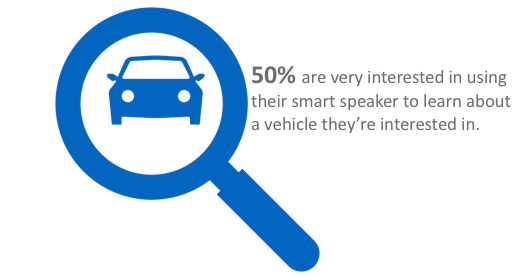Of all the industries we looked at in our recent smart speaker user experience research, automotive has made the most inroads when it comes to smart speaker technology and adoption.
This shouldn't be surprising, as driving is ripe for hands-free technology interactions. Many automotive manufacturers have already deployed voice-enabled technologies in their vehicles. In fact, IMS Research estimates that 55% of all new vehicles will provide some version of this technology by 2019. From our perspective, that's a slow adoption rate considering the demand for the technology, increasing the likelihood that users will adopt aftermarket solutions.
Furthermore, the quality of today’s automotive smart speakers varies. One of the top search results for BMW iSpeech is a list of commands, which suggests that current users are finding it difficult to use the technology. No doubt this explains the recent announcement that Amazon’s Alexa is coming to BMWs this year.
Of the smart speaker owners we surveyed:

Beyond using a smart speaker within a vehicle, there are several other applications for voice. These include using a smart speaker to learn about and shop for vehicles as well as using a smart speaker to control the “smart car” apps (e.g., HondaLink) that can get diagnostic information about the car, receive notifications, and schedule dealership appointments.

While age played a role in receptivity to smart speakers across all industries, it was most pronounced in automotive.
- While our survey panel as a whole was 50% very interested in using their smart speaker to learn about a vehicle they’re interested in, for respondents aged 21-34, this number was 61%.
- Our survey panel was 57% very interested in using a smart speaker in their car, for respondents aged 21-34, this number was 69%. Indeed, this was the highest rated functionality after tracking a delivery package for any demographic.
This indicates automotive brands focused on younger buyers in particular should prioritize voice interactions, but that all manufacturers should be looking to ramp up their voice-enabled offerings. Further, there are clearly opportunities to support automotive shopping via smart speaker.
We recommend that automotive brands:
- Partner with smart speaker manufacturers to provide in-vehicle voice interactions.
- Conduct in-context usability research to improve voice interactions with more context-aware functionality.
- Conduct exploratory research to better understand the wants and needs of younger buyers that could be addressed through voice.
- Look to replicate functionality currently provided through automotive mobile apps (e.g., remote diagnostics).
For more details, download the full automotive smart speaker findings report: Research-based insights for designing automotive voice interactions.